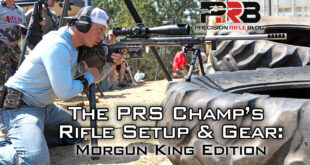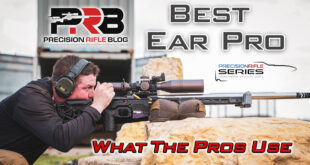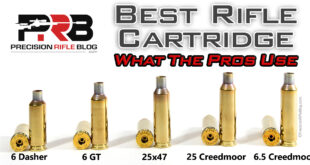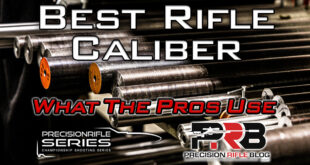This post is about what calibers and cartridges the best precision rifle shooters are using. It is based on what the top 50 long-range shooters nationwide brought with them to the Precision Rifle Series Finale a couple weeks ago. Target engagements for a PRS match can range from 25 to 1,200+ yards, but there is definitely a focus on the “precision” rifle part regardless of the range. For more info on who these guys are, and why you should care what they think scroll to the bottom of this article.
Best Long-Range Caliber
Last year’s data showed that many shooters were moving to 6mm cartridges, although the majority of competitors were still using the perennial favorite 6.5mm. This sparked a lot of debate in the shooting community, and many were anxious to see if that trend continued in the 2013 Finale results. Well, it looks like even more switched to the 6mm caliber this year, with over 50% of the competitors using 6mm.

The top shooters were even more fond of the 6mm caliber, as you can see from the top 20 chart below. There is a question about whether that is correlation or causation, which essentially is just saying did those shooters place higher because they were using a 6mm … or did it just so happen that the best shooters chose to use a 6mm cartridge. You’d likely need random sampling and a larger sample size to be able to answer that definitively, so I’ll leave it up to you guys to debate. Regardless of how much it impacted the results, one thing is undeniable: the best precision rifle shooters in the country are choosing 6mm … for the second year in a row (view last year’s results). Once again, the majority of shooters who finished in the top 20 were using a 6mm cartridge.

The data shows that shooters who used a 6mm rifle placed better on average than shooters using other cartridges. Again, there is a question of correlation or causation … but I’m just trying to present the data.

Best Long-Range Cartridge
Last year, the majority of shooters were using the same handful of cartridges, and most of those same cartridges were popular again this year, although the mix changed some. The 260 Rem was knocked off as the most popular cartridge overall by the 6.5 Creedmoor. The 260 has been the go-to cartridge and default choice for long-range shooters for years, and while the 260 remains a good cartridge … this could mark the end of an era. It is certainly a vote of confidence for the 6.5 Creedmoor from a group of guys that know what they’re talking about. A outstanding round among a long list of great cartridges.
There was a three-way tie for 2nd most popular cartridge by the 6×47 Lapua, 6mm Creedmoor, and the 260 Rem. Those were followed by the 6XC and the 6.5×47 Lapua, which made a big jump in popularity among the precision shooters.

There was just one competitor using a cartridge larger than 6.5mm. Last year there were three 7mm cartridges represented, but there wasn’t a single one this year. One thing that surprised me was seeing a 300 Win Mag represented. Somebody went old school.
Here is how the competitors placed overall based on the cartridge they were using at the finale. Last year the 6mm Creedmoor and the 6XC had the lowest average finish, and those cartridges were at the top of the list again this year. The 6.5×47 Lapua had the 4th lowest average finish last year, and it hopped to 2nd at this year’s finale.

One surprise was the high average finish of the 6.5 Creedmoor, when almost 20% of the shooters were using that cartridge. Only one of those shooters using a 6.5 Creedmoor ended up in the top 25. I’m not trying to say that the 6.5 Creedmoor is somehow inferior to these other cartridges, but it is interesting.
And the 243 Win seems to have fallen out of favor in this year’s competition. 8 shooters were using a 243 Win last year, but only 5 brought that cartridge this year. And it had the 3rd best average finish last year, and this year it was at the bottom of the pile.
| Caliber | Cartridge | # of Shooters | Avg Final Rank |
|---|---|---|---|
| 6mm | 6XC | 7 | 25 |
| 6mm Creedmoor | 8 | 28 | |
| 6mm×47 | 8 | 29 | |
| 243 Win | 5 | 59 | |
| 6mm Competition Match | 1 | Not Enough Data | |
| 6.5mm | 6.5×47 | 7 | 26 |
| 260 Rem | 8 | 32 | |
| 6.5 Creedmoor | 10 | 43 | |
| 6.5 LRP | 1 | Not Enough Data | |
| 30 Caliber | 300 Win Mag | 1 | Not Enough Data |
Most Popular Cartridges For Precision Rifles
Here is a look at the cases for the top six cartridges, which are all the cartridges with at least 10% of shooters using them. These six combined to make up 85% of the cartridges used. Thanks to AmmoGuide.com for allowing me to use their cartridge images for this visualization.

You can see that all of these cartridges are very similar in design and case capacity.

There are a few modern cartridge attributes that are common to virtually every cartridge designed in the past 20 years:
- Steeper shoulder slope (around 30°). Older cartridge designs have a more shallow shoulder, typically around 20°. Cartridge designers have found a 30 degree has a lot of benefits. One is that it slows case growth, which means less trimming and longer brass life. Another benefit is the difference of how pressure builds with steeper shoulders, which can allow you to get the same velocities with less powder. Here is how David Tubb describes some of these benefits for the 6XC (source): “The 6XC’s 30-degree case shoulder retards case growth (less trimming required). I have found that velocities attainable with the 6XC are equivalent to those attainable using .243 Win. Barrel life is much better than .243 Win. due to the fact that the 6XC has about 7 grains less powder capacity.” This may also reduce barrel wear, because of where the “turbulence point” is on the cartridge (either inside or outside the case). In another article, David says “Pressure data indicates higher attainable velocities compared to a standard .243 Winchester cartridge. The 6XC attains these higher velocities with less propellant and lower pressures (superior case design is the reason). The Turbulence Point (TP) is situated inside the case neck so increased barrel life over case designs such as the .243 Win. where the TP point is down the barrel.”
- Longer case neck (around 0.30″). Modern cartridges are designed with a longer neck to better support the bullet. This can promote concentricity and ensure the bullet is more perfectly aligned with the bore.
The 260 Rem is the only cartridge out of this bunch that doesn’t closely match these attributes. It has a 20° shoulder and the neck is 0.2595″. Does that mean its a train-wreck? Absolutely not. I just thought it was interesting to notice.
One other thing to notice is that the Lapua cases (both the 6.5×47 Lapua and the 6×47 Lapua) use a small rifle primer, which the other 5 use a large rifle primer. David Tubb has cited that “a detailed study of large and small rifle primers showed that large rifle primers worked best when the propellant charge exceeds 35 grains.” I’m not familiar with that study, and he didn’t cite any sources. All of these cases have a typical powder charge weight around 40-45 grains. That isn’t to say the 6.5×47 Lapua is not a super-accurate cartridge, just one thing that differentiates these very similar cartridges.
If you’d like to see the exact dimensions for these cartridges, click on the image below. I couldn’t find the cartridge dimensions for the 6mm Creedmoor, but the others are provided. Thanks again to AmmoGuide.com for allowing me to provide these diagrams.
Meet The Pros
 The Precision Rifle Series (PRS) is a championship style point series race based on the best precision rifle matches nationwide. PRS matches are recognized as the major league of sniper-style rifle matches. At the end of each year, the scores from 15 different matches are evaluated and the top 50 shooters nationwide are invited to compete head to head in the PRS Finale Match. The info below is based on the equipment those pros brought with them to the most recent finale. This is a great set of data, because 50 shooters is a significant sample size, and this particular group are also considered experts among experts. Thanks to Rich Emmons for allowing me to share this info. To find out more about the PRS, check out What Is The Precision Rifle Series?
The Precision Rifle Series (PRS) is a championship style point series race based on the best precision rifle matches nationwide. PRS matches are recognized as the major league of sniper-style rifle matches. At the end of each year, the scores from 15 different matches are evaluated and the top 50 shooters nationwide are invited to compete head to head in the PRS Finale Match. The info below is based on the equipment those pros brought with them to the most recent finale. This is a great set of data, because 50 shooters is a significant sample size, and this particular group are also considered experts among experts. Thanks to Rich Emmons for allowing me to share this info. To find out more about the PRS, check out What Is The Precision Rifle Series?
Other “What The Pros Use” Articles
This post was one of a series of posts that look at the equipment the top 50 shooters in the country use. Check out these other posts:
- Best Rifle Calibers & Cartridges
- Best Long-Range Scopes
- Best Gunsmiths
- Best Actions
- Best Barrels
- Best Stocks
- Best Precision Bullets, Powders & Brass
- Best Muzzle Brake & Rifle Suppressor
- Best Shooting Rest Bags
 PrecisionRifleBlog.com A DATA-DRIVEN Approach to Precision Rifles, Optics & Gear
PrecisionRifleBlog.com A DATA-DRIVEN Approach to Precision Rifles, Optics & Gear






What about the 6.5×284 as a long range cartridge? Did it not even place and why? I love mine.
Darrell, that’s a great question. I’m not sure why none of these top shooters chose the 6.5×284. It is certainly a proven winner for 600 and 1000 yard benchrest competitions, and has a strong following in F-class as well. The water capacity of the 6.5-284 Norma is 66 grains, and it looks like all of the most popular cartridges in the PRS have a very similar capacity ranging from 45 to 53 grains. The data would point the conclusion that most of these guys agree that the smaller powder capacity is ideal for these types of events (for some reason). The lower powder capacity does equate to less recoil and longer barrel life … so those might be the drivers. Honestly, I really don’t know. It is certainly a great cartridge, but there wasn’t a single shooter using it.
Thanks for your dedication to put this together.
Thanks for the interesting info, nice job!
If you ask Scandinavians it will be 6,5x55SE that is rarely seen in US.
The 6.5x55mm Swedish Mauser is certainly a great round. In fact, it’s actually included in Berger’s new reloading manual, which I think is a testament to how successful it’s proven itself to be as a precision cartridge. It might have taken us Americans a long time to come around to the 6.5mm cartridge … but we’re on-board now. And although the 6.5x55mm Swedish Mauser was designed in 1891, it closely resembles those really popular modern cartridges (water capacity of 57 grains, 25° shoulder, .313″ neck) … or maybe they closely resemble it. I have a friend that shoots that cartridge, and he is a evangelical about it as well. However, if it had a clear ballistic advantage over these other cartridges I guarantee one of these guys would be using it. These guys are the best of the best, and fierce competitors.
Thanks for the input!
Very informative site. Essential information in a neat concise form.
The 6mm Norma BR should definitely be there. Cant imagine its not high in the ranking.
The 6mm BR is a very popular round, especially in the Benchrest world. But there wasn’t a single shooter in the top 50 surveyed who said they use that round. I’m not sure why it isn’t, because it is a very capable round. I just know it isn’t in the data from the Precision Rifle Series shooters.
Interesting. I known a very popular setup at Perry is the Eliso style stock, bolt gun repeater, in 6BR. Shot by local Mark Laramie and others. Im the president of the only 1000 yard range in the northeast and this is by far the choice among shooter I see on the line out to 600 yards. A ideal round for ATC. Of course there are many 6mm choices available today. Excellent artical! Thanks
You said
“One other thing to notice is that the Lapua cases (both the 6.5×47 Lapua and the 6×47 Lapua) use a small rifle primer, which the other 5 use a large rifle primer. ”
Well Tubbs 6XC’s Parent Case is the 22-250 and both (22-250 and Tubbs 6XC) use a SMALL RIFLE PRIMER.
I think you might be confused. Both the 6XC and the 22-250 use LARGE RIFLE PRIMERS. Look it up.
What is everyone’s thoughts on shooting mats? I need to purchase one but, with there being so many options, don’t even know where to start. Any suggestions, question’s, comments would be greatly appreciated!
Thanks
Brian
Hey Brian, thats a great question. I use a shooting mat when I practice prone, but just to be clear … its rare to see a mat in tactical/practical competitions, like these Precision Rifle Series matches. I just mention that because all these “What The Pros Use” articles are focused on the gear the top Precision Rifle Series shooters use in competitions.
Having said that, here are some of the popular options out there and what I’d recommend depending on your needs and budget:
I don’t like the drag bag style shooting mats. In my opinion those are not good at being a rifle bag or a shooting mat … they are sub-par at both. A lot of guys must like them though, because there seems to be a million of them out there.
I’ve also tried camping mats, like the ThermARest foam mats. Those don’t last long out in the field. When you’re camping, you typically don’t squirm around and place heavy rifles on your mattress, so they aren’t designed to take that kind of abuse. You also typically don’t place them directly on rocks or plants. They just aren’t in the same class of durability as these others, and I won’t carry one (anymore) because of that.
Anyone else have a recommendation for a good shooting mat?
Nothing wrong with 6.5-284 Norma (and it certainly has better external ballistics). It’s just considered a barrel-burner by those who shoot a LOT of rounds. Re-barreling every 2 years is less hassle than every 1.5 years. These are just the Goldilocks cartridges balancing bbl burn vs. performance, and all within a sweet spot for efficiency too.
Great point, I couldn’t agree more. The 6.5-284 is an amazing cartridge, and the only drawback is shorter barrel life than most of the others listed. Thanks for the comments.
I bet a lot of shooters don’t want increased recoil either or muzzle blast.
Really enjoyed your post, and found much needed information.
Thanks for the kind words, Don. I appreciate it.
Cal
can you make a barrel that will fit aThompson Center Pro Hunter oncore for with a 300 Weatherby cal
Hey, Donald. I can’t, but I’m sure most competent gunsmiths could. I plan to publish a long list of the best gunsmiths in the country this evening. You might check that out, as a place to start.
Since you’re talking about a magnum, I might also suggest Quarter Minute Magnums. That guy can make magnums shoot like a 6 PPC benchrest rifle (or at least close). 😉 http://www.quarterminutemagnums.com
Thanks,
Cal
i have ben using 6,5*55 scan for 16 years in a sauer 200 str some of the barrels last more than 12000 rounds befor it starts to vear out . i have had many 5 shot rounds less than 10mm holes mostley used lapua scenar 7 gram and Raufoss brass and vit n-140 powder
The 6.5×55 is quite the round. America avoided the metric calibers for a long time, but everything old is new again, right? It’s funny how times have changed and we’re coming back around to cartridges very similar to the old European classic 6.5×55. It was designed in 1891 and still competes against these modern cartridges! It’s certainly stood the test of time.
Reblogged this on blog Uvsonmidrange .